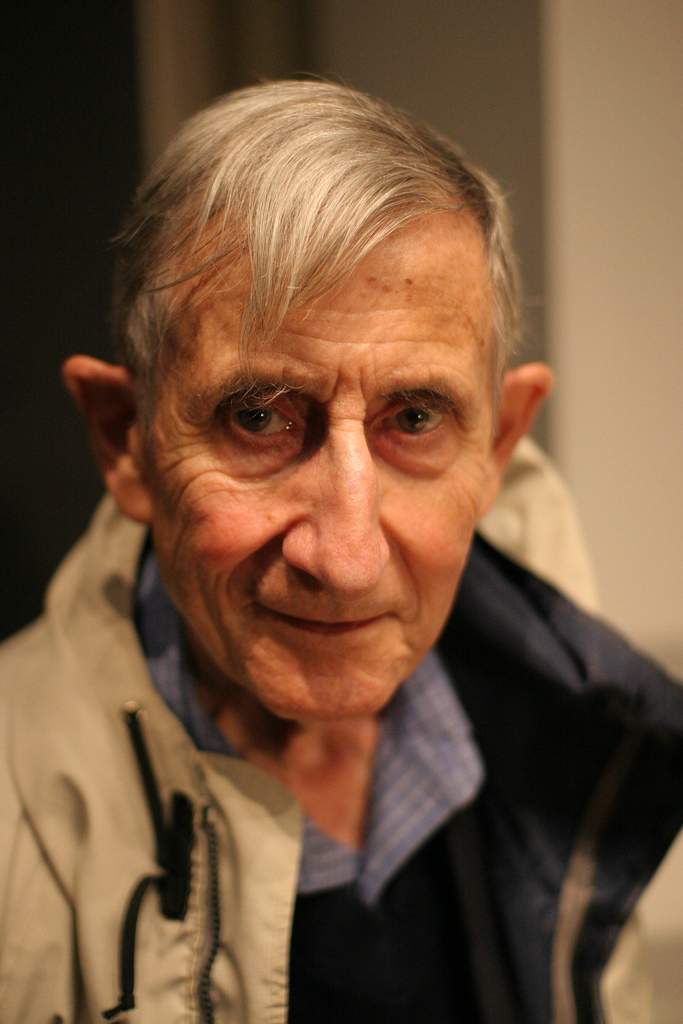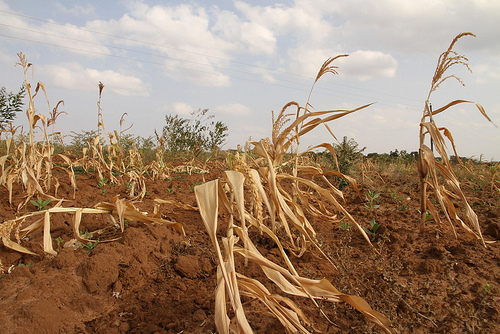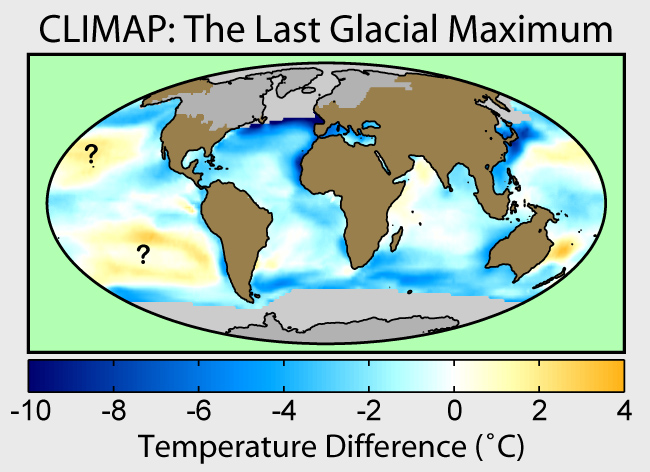 To say that Freeman Dyson is a highly respected scientist is an understatement. Over his 91 years, he has made seminal discoveries in mathematics and physics; written evocatively (and provocatively) on what it means to be a scientist, the role of science in society, and the culture of science; shared the fruits of his imagination about possible future discoveries and their implications for humanity; and generally offered up one fresh and unexpected view after another on topics from space travel to genetic engineering and beyond.
To say that Freeman Dyson is a highly respected scientist is an understatement. Over his 91 years, he has made seminal discoveries in mathematics and physics; written evocatively (and provocatively) on what it means to be a scientist, the role of science in society, and the culture of science; shared the fruits of his imagination about possible future discoveries and their implications for humanity; and generally offered up one fresh and unexpected view after another on topics from space travel to genetic engineering and beyond.
By all accounts, he’s a modest and funny man, a loving husband and father, and a continued source of inspiration to his colleagues at the Princeton Institute for Advanced Studies. However, since 2007, he’s been purporting to be the voice of “moderation” on the topic of climate change. Casting himself in the role of objective, outside observer, he has declared that climate scientists are caught up in their own hype, in love with their own models, and distracting society from ills far more important than climate change.
I wish that he were right. It would be swell if climate change were really not a big deal. But he’s not, and it is.
Dyson is on tour, promoting his new book Dreams of Earth and Sky (2015). On May 2, 2015, he was interviewed by Scott Simon on NPR’s Weekend Edition. If the interview is any indication, Dyson’s book tour could sow an awful lot of confusion about the scientific consensus on climate change. Here’s what Dyson said (in all caps):
WHAT I WOULD LIKE TO EMPHASIZE IS THAT HUMAN ACTIONS HAVE VERY LARGE EFFECTS ON THE ECOLOGY, WHICH HAVE NOTHING TO DO WITH THE CLIMATE.
True, but where are you going with this? Human activities—farming, fishing, timber harvesting, urbanization, industrial waste—all have dramatic and frequently compounding effects on “the ecology.” Indeed, the fact that “the ecology” is under multiple non-climate stresses makes it all the more vulnerable to a changing climate.
CARBON DIOXIDE IS WHAT WE'RE PRODUCING IN BIG QUANTITIES AND PUTTING INTO THE ATMOSPHERE. THIS HAPPENS TO BE A VERY GOOD FERTILIZER FOR ALL KINDS OF VEGETATION, GOOD FOR WILDLIFE, GOOD FOR AGRICULTURAL PRODUCTION, SO IT HAS MANY BENEFITS.
This is one of the most tired and thoroughly debunked climate change denier arguments—the equivalent of the creationists’ “But where are the transitional fossils?” argument. Really, how many times do we have to kill these zombies? For a thorough take-down of this persistent misconception, visit Skeptical Science. Or just think about it for more than three seconds. Dyson’s paean to carbon dioxide would be appropriate only if CO2 we re everywhere and always the sole limiting factor on plant growth—which really could only be the case if all plants were grown in controlled environments like greenhouses. Moreover, it would be appropriate only if drought, extreme temperature events, desertification, sea level rise, and all of the other consequences of climate change will have no negative effects on plant productivity. It isn’t, and they won’t.
re everywhere and always the sole limiting factor on plant growth—which really could only be the case if all plants were grown in controlled environments like greenhouses. Moreover, it would be appropriate only if drought, extreme temperature events, desertification, sea level rise, and all of the other consequences of climate change will have no negative effects on plant productivity. It isn’t, and they won’t.
AND THIS IS SOMETHING YOU HAVE TOGETHER WITH THE CLIMATE EFFECTS, WHICH ARE MUCH LESS CERTAIN, SO IT'S A QUESTION OF DRAWING A BALANCE.
The “climate effects,” on which there is a vast body of scientific research literature , are a lot more certain than the wishful-thinking-at-best benefits of rising CO2 to plants. Besides, would increased plant productivity due to rising CO2 really balance out all the other consequences of climate change? After all, what profit a man if he shall gain a few tomatoes and lose a coastal metropolis?
, are a lot more certain than the wishful-thinking-at-best benefits of rising CO2 to plants. Besides, would increased plant productivity due to rising CO2 really balance out all the other consequences of climate change? After all, what profit a man if he shall gain a few tomatoes and lose a coastal metropolis?
I'M JUST SAYING I DON'T UNDERSTAND IT AND NEITHER DOES ANYBODY ELSE. I'M SKEPTICAL BECAUSE I DON'T THINK THE SCIENCE IS AT ALL CLEAR, AND UNFORTUNATELY A LOT OF THE EXPERTS REALLY BELIEVE THEY UNDERSTAND IT, AND MAYBE HAVE THE WRONG ANSWER.
Really, Professor Dyson? That’s the best you can come up with? That’s right up there with the “I’m not a scientist, but…” line that has become so popular of late with politicians. Actually, tens of thousands of scientists, from multiple disciplines, in a vast number of studies spanning decades, have combined all their data and come to the conclusion—disturbing as it is—that the climate is definitely warming, that CO2 emissions from human activities are responsible, and that the consequences are likely to be both serious and increasingly difficult to prevent the longer action is delayed.
OF COURSE [THE WEATHER] CONCERNS ME, BUT OF COURSE, WE DON'T KNOW MUCH ABOUT THE CAUSES OF THOSE THINGS. WE DON'T EVEN KNOW FOR SURE WHETHER IT IS MORE VARIABLE THAN IT USED TO BE.
A classic bait and switch. The question isn’t whether weather is more variable (although there’s growing evidence that climate change is contributing to stronger hurricanes and other severe weather events); the question is whether the planet is warming, the sea level rising, and the pH of the ocean falling. The answer is yes; these are all well-established results of the science. Talking about variations in the weather is just a distraction.
I MEAN THE WORST DISASTERS WERE THE ICE AGES, AND NOBODY REALLY UNDERSTANDS FOR SURE THE CAUSES OF ICE AGES, …
Actually, scientists have a pretty good handle on what caused the Ice Ages. For a fascinating tour through the his tory of Ice Age science, I recommend an excellent essay posted on the website of the American Institute of Physics. To make a long story short, not only do scientists know a lot about the causes of Ice Ages, they know that we should be entering one now, but human emissions of CO2 are overriding the natural cycles.
tory of Ice Age science, I recommend an excellent essay posted on the website of the American Institute of Physics. To make a long story short, not only do scientists know a lot about the causes of Ice Ages, they know that we should be entering one now, but human emissions of CO2 are overriding the natural cycles.
….SO I'M NOT SAYING THE CLIMATE DISASTERS AREN'T REAL, I'M MERELY SAYING WE DON'T KNOW HOW TO PREVENT THEM.
By parity of reasoning, he might have concluded, “…so I’m not saying that earthquakes aren’t real, I’m merely saying we don’t know how to prevent them.” That isn’t really relevant, is it? We prepare for earthquakes whether we can prevent them or not. In fact, because we can’t prevent them, we are even more obliged to prepare for them. We can—and we should—both take what actions are needed to slow the rate of climate change and prepare for the consequences we can’t prevent.
Not that it will do any good, but I implore Professor Dyson to take a good hard look at the scientific evidence and think again—especially because his deserved scientific eminence may lead the public to overindulge at his smorgasbord of misconceptions.
Dyson photo credit: "Freeman Dyson" by Taken by Flickr user ioerror, Jacob Appelbaum
Map credit: "CLIMAP". Licensed under CC BY-SA 3.0 via Wikimedia Commons - http://commons.wikimedia.org/wiki/File:CLIMAP.jpg#/media/File:CLIMAP.jpg

